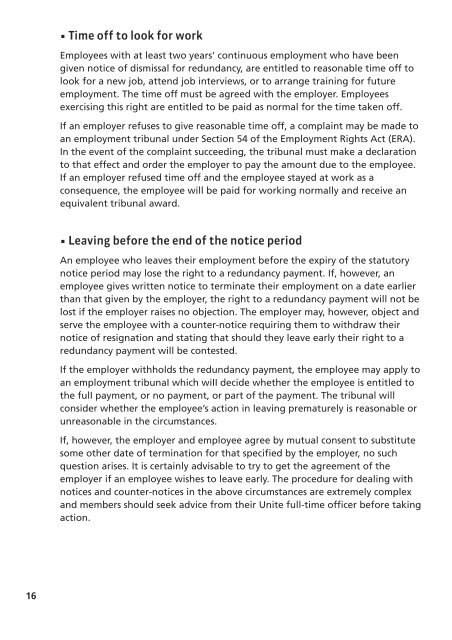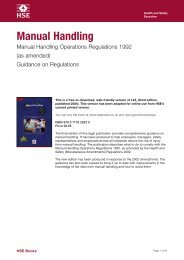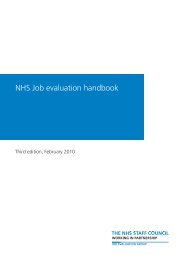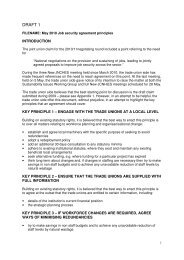Redundancy - Unite the Union
Redundancy - Unite the Union
Redundancy - Unite the Union
You also want an ePaper? Increase the reach of your titles
YUMPU automatically turns print PDFs into web optimized ePapers that Google loves.
• Time off to look for work<br />
Employees with at least two years’ continuous employment who have been<br />
given notice of dismissal for redundancy, are entitled to reasonable time off to<br />
look for a new job, attend job interviews, or to arrange training for future<br />
employment. The time off must be agreed with <strong>the</strong> employer. Employees<br />
exercising this right are entitled to be paid as normal for <strong>the</strong> time taken off.<br />
If an employer refuses to give reasonable time off, a complaint may be made to<br />
an employment tribunal under Section 54 of <strong>the</strong> Employment Rights Act (ERA).<br />
In <strong>the</strong> event of <strong>the</strong> complaint succeeding, <strong>the</strong> tribunal must make a declaration<br />
to that effect and order <strong>the</strong> employer to pay <strong>the</strong> amount due to <strong>the</strong> employee.<br />
If an employer refused time off and <strong>the</strong> employee stayed at work as a<br />
consequence, <strong>the</strong> employee will be paid for working normally and receive an<br />
equivalent tribunal award.<br />
• Leaving before <strong>the</strong> end of <strong>the</strong> notice period<br />
An employee who leaves <strong>the</strong>ir employment before <strong>the</strong> expiry of <strong>the</strong> statutory<br />
notice period may lose <strong>the</strong> right to a redundancy payment. If, however, an<br />
employee gives written notice to terminate <strong>the</strong>ir employment on a date earlier<br />
than that given by <strong>the</strong> employer, <strong>the</strong> right to a redundancy payment will not be<br />
lost if <strong>the</strong> employer raises no objection. The employer may, however, object and<br />
serve <strong>the</strong> employee with a counter-notice requiring <strong>the</strong>m to withdraw <strong>the</strong>ir<br />
notice of resignation and stating that should <strong>the</strong>y leave early <strong>the</strong>ir right to a<br />
redundancy payment will be contested.<br />
If <strong>the</strong> employer withholds <strong>the</strong> redundancy payment, <strong>the</strong> employee may apply to<br />
an employment tribunaI which wiII decide whe<strong>the</strong>r <strong>the</strong> employee is entitled to<br />
<strong>the</strong> fulI payment, or no payment, or part of <strong>the</strong> payment. The tribunal will<br />
consider whe<strong>the</strong>r <strong>the</strong> employee’s action in leaving prematurely is reasonable or<br />
unreasonable in <strong>the</strong> circumstances.<br />
If, however, <strong>the</strong> employer and employee agree by mutual consent to substitute<br />
some o<strong>the</strong>r date of termination for that specified by <strong>the</strong> employer, no such<br />
question arises. It is certainly advisable to try to get <strong>the</strong> agreement of <strong>the</strong><br />
employer if an employee wishes to leave early. The procedure for dealing with<br />
notices and counter-notices in <strong>the</strong> above circumstances are extremely complex<br />
and members should seek advice from <strong>the</strong>ir <strong>Unite</strong> full-time officer before taking<br />
action.<br />
16

















